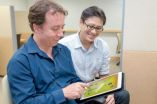(Press-News.org) CHICAGO, IL—Muscle wasting that occurs as a result of cancer negatively impacts the well-being and recovery prospects of millions of patients, particularly the rapidly-growing elderly populations in Western societies. Drugs called selective androgen receptor modulators (SARMs) offer hope for these patients, and a new SARM for transdermal administration is promising excellent efficacy without harming liver function and HDL levels. Results and conclusions were presented Tuesday at the joint meeting of the International Society of Endocrinology and the Endocrine Society: ICE/ENDO 2014 in Chicago.
SARMs are able to stimulate the growth of muscle with effects similar to those seen by use of traditional anabolic steroids but without the undesirable side effects of those established muscle-building drugs, in particular, the adverse effects on prostate health that can occur from their use.
There are several SARMs currently in human clinical trials, with successful animal studies having already been conducted with these compounds. However, all of these drug candidates have been developed for oral administration. Because of potential adverse effects on liver function and on depression of HDL levels (the "good" cholesterol), the orally-administered drugs suffer limitations to their full therapeutic potential to grow muscle and strengthen bone.
A similar situation for oral delivery exists in the administration of male hormone therapy. Here, the adverse impacts on liver health and HDL levels can be overcome by the use of skin patches or gel that release a drug directly into the body through the skin, i.e., transdermal application. Recognizing the similarity, scientists at the pharmaceutical company Novartis therefore developed a SARM specifically for transdermal administration. In describing their drug candidate, AUSRM-057, Senior Investigator Dr. Hans-Joerg Keller of the Novartis Institutes for BioMedical Research, Basel, Switzerland said, "AUSRM-057 is the first SARM with excellent skin permeation properties which may exploit the full therapeutic potential of SARMs."
In this preclinical drug discovery project, Novartis researchers used classical techniques of drug development, first identifying a compound with good potential as a muscle-building drug in cell culture. Skin permeation tests, also conducted in cell culture, predicted that their drug candidate would show good penetration of skin in transdermal delivery. The drug did work as predicted in building muscle when tested in rats and did not show the masculinizing effects of SARMs that can harm the prostate gland. The authors are optimistic regarding the prospects of this drug candidate to become the first in its class to utilize not only the advantages SARMs have displayed for muscle growth without negative impacts on prostate health, but, by avoiding the digestive system, to also avoid adverse effects on liver function and HDL levels.
INFORMATION:
The research to develop AUSRM-057 was funded entirely by Novartis, although the project has been stopped for now due to what the authors termed "portfolio prioritization".
Founded in 1916, the Endocrine Society is the world's oldest, largest and most active organization devoted to research on hormones and the clinical practice of endocrinology. Today, the Endocrine Society's membership consists of over 17,000 scientists, physicians, educators, nurses and students in more than 100 countries. Society members represent all basic, applied and clinical interests in endocrinology. The Endocrine Society is based in Washington, DC. To learn more about the Society and the field of endocrinology, visit our site at http://www.endocrine.org. Follow us on Twitter at https://twitter.com/#!/EndoMedia.
New transdermal SARM drug for muscle-wasting offers hope for older cancer patients
Drug avoids negative impact on liver function, HDL levels
2014-06-24
ELSE PRESS RELEASES FROM THIS DATE:
Gender differences could mean more risk for cardiovascular death
2014-06-24
Queen's University assistant professor Pendar Farahani (Department of Medicine and Department of Public Health Sciences) is advocating the use of gender-based treatment for mitigating the cardiovascular risk factors related to diabetes.
Research has shown women with Type 2 diabetes and high cholesterol are less likely than their male peers to reach treatment goals to lower their bad cholesterol, or low-density lipoprotein (LDL) cholesterol.
"The findings suggest the need for gender-based evaluation and treatment of cardiovascular risk factors in these patients," says ...
Study finds high CD4 cell counts associated with reduced risk of ischemic stroke for those with HIV
2014-06-24
OAKLAND, Calif., June 24, 2014 — A 15-year study found that HIV-positive individuals had a 40 percent increased risk of ischemic stroke, however stroke rates were nearly the same for HIV-positive individuals with high CD4 cell counts as for HIV-negative subjects.
The study, published recently in AIDS, the official journal of the International AIDS Society, covered the years 1996 through 2011 and included nearly 25,000 HIV-positive individuals.
Ischemic stroke is caused by plaque build-up in blood vessels, which can lead to constriction or actual obstruction of blood ...
Bizarre parasite from the Jurassic
2014-06-24
Around 165 million years ago, a spectacular parasite was at home in the freshwater lakes of present-day Inner Mongolia (China): A fly larva with a thorax formed entirely like a sucking plate. With it, the animal could adhere to salamanders and suck their blood with its mouthparts formed like a sting. To date no insect is known that is equipped with a similar specialised design. The international scientific team is now presenting its findings in the journal "eLIFE".
The parasite, an elongate fly larva around two centimeters long, had undergone extreme changes over the ...
Aging accelerates genomic changes, signaling challenges for personalized medicine
2014-06-24
Exploiting individual genomes for personalized medicine may be more complicated than medical scientists have suspected, researchers at the Virginia Bioinformatics Institute of Virginia Tech have discovered.
In a paper published in June in the journal Aging, scientists from the institute's Medical Informatics and Systems Division found that spontaneous mutations occur in our bodies constantly, but the rate of change differed dramatically among various people.
The study has implications for personalized medicine, which will make use of genomic information to predict future ...
Young women with PCOS are 5 times more likely to develop type 2 diabetes
2014-06-24
A leading expert on reproductive health says young women with Polycystic Ovary Syndrome (PCOS) have a startlingly higher risk of developing type 2 diabetes, even if young and not overweight.
The research led by Professor Helena Teede and Dr Anju Joham, from the School of Public Health and Preventive Medicine at Monash University analysed a large-scale epidemiological study, called the Australian Longitudinal Study of Women's Health, which revealed the findings.
Over 6000 women aged between 25-28 years were monitored for nine years, including 500 with diagnosed PCOS. ...
New possibilities for leukemia therapy with a novel mode of leukemia cell recognition
2014-06-24
Singapore, 24 June 2014—Scientists at A*STAR's Singapore Immunology Network (SIgN) have discovered a new class of lipids in the leukaemia cells that are detected by a unique group of immune cells. By recognising the lipids, the immune cells stimulate an immune response to destroy the leukaemia cells and suppress their growth. The newly identified mode of cancer cell recognition by the immune system opens up new possibilities for leukaemia immunotherapy .
Leukaemia is characterized by the accumulation of cancer cells originating from blood cells, in the blood or bone marrow. ...
NTU study shows puzzle games can improve mental flexibility
2014-06-24
Want to improve your mental finesse? Playing a puzzle game like Cut the Rope could just be the thing you need.
A recent study by Nanyang Technological University (NTU) scientists showed that adults who played the physics-based puzzle video game Cut the Rope regularly, for as little as an hour a day, had improved executive functions.
The executive functions in your brain are important for making decisions in everyday life when you have to deal with sudden changes in your environment – better known as thinking on your feet. An example would be when the traffic light ...
Cancer: The roots of evil go deep in time
2014-06-24
Every year around 450,000 people in Germany are diagnosed with cancer. Each one of them dreams of a victory in the battle against it. But can cancer ever be completely defeated? Researchers at Kiel University (CAU) have now reached a sobering conclusion: "cancer is as old as multi-cellular life on earth and will probably never be completely eradicated", says Professor Thomas Bosch in his latest research results. The study by an international team led by Bosch was published today (Monday, June 24) in the prestigious scientific journal Nature Communications.
The so-called ...
The great salmon run algorithm
2014-06-24
Solving complex problems is rarely a straightforward process, there are often many variables and countless plausible solutions each one of which has its pros and cons. Mechanical engineers at the Babol University of Technology in Mazandaran, Iran, have turned to nature to devise an algorithm based on the survival trials faced by salmon swimming upstream to the spawning grounds to help them fish out the optimal solution to a given problem. They provide details in the International Journal of Computer Applications in Technology.
Bio-inspiration has been widely used in problem ...
Restricting competitors could help threatened species cope with climate change
2014-06-24
Threatened animal species could cope better with the effects of climate change if competition from other animals for the same habitats is restricted, according to new research by Durham University.
The Durham team studied the impacts of climate on the Alpine Chamois, a species of mountain goat, and the effects that domestic sheep had on the goats' movements.
Observing the goats in the Italian Alps during the summer, the researchers found that Chamois tended to move to higher altitudes where it is cooler on hotter days and in the middle of the day, but moved much higher ...
LAST 30 PRESS RELEASES:
Microalgae-derived biochar enables fast, low-cost detection of hydrogen peroxide
Researchers highlight promise of biochar composites for sustainable 3D printing
Machine learning helps design low-cost biochar to fight phosphorus pollution in lakes
Urine tests confirm alcohol consumption in wild African chimpanzees
Barshop Institute to receive up to $38 million from ARPA-H, anchoring UT San Antonio as a national leader in aging and healthy longevity science
Anion-cation synergistic additives solve the "performance triangle" problem in zinc-iodine batteries
Ancient diets reveal surprising survival strategies in prehistoric Poland
Pre-pregnancy parental overweight/obesity linked to next generation’s heightened fatty liver disease risk
Obstructive sleep apnoea may cost UK + US economies billions in lost productivity
Guidelines set new playbook for pediatric clinical trial reporting
Adolescent cannabis use may follow the same pattern as alcohol use
Lifespan-extending treatments increase variation in age at time of death
From ancient myths to ‘Indo-manga’: Artists in the Global South are reframing the comic
Putting some ‘muscle’ into material design
House fires release harmful compounds into the air
Novel structural insights into Phytophthora effectors challenge long-held assumptions in plant pathology
Q&A: Researchers discuss potential solutions for the feedback loop affecting scientific publishing
A new ecological model highlights how fluctuating environments push microbes to work together
Chapman University researcher warns of structural risks at Grand Renaissance Dam putting property and lives in danger
Courtship is complicated, even in fruit flies
Columbia announces ARPA-H contract to advance science of healthy aging
New NYUAD study reveals hidden stress facing coral reef fish in the Arabian Gulf
36 months later: Distance learning in the wake of COVID-19
Blaming beavers for flood damage is bad policy and bad science, Concordia research shows
The new ‘forever’ contaminant? SFU study raises alarm on marine fiberglass pollution
Shorter early-life telomere length as a predictor of survival
Why do female caribou have antlers?
How studying yeast in the gut could lead to new, better drugs
Chemists thought phosphorus had shown all its cards. It surprised them with a new move
A feedback loop of rising submissions and overburdened peer reviewers threatens the peer review system of the scientific literature
[Press-News.org] New transdermal SARM drug for muscle-wasting offers hope for older cancer patientsDrug avoids negative impact on liver function, HDL levels



